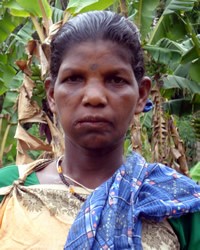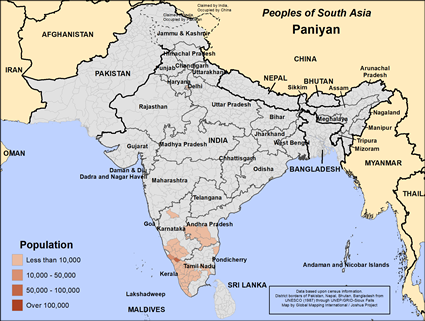Paniyan in India

Photo Source:
Copyrighted © 2026
Philipose Vaidyar All rights reserved. Used with permission |

Map Source:
People Group data: Omid. Map geography: UNESCO / GMI. Map Design: Joshua Project.
|
| People Name: | Paniyan |
| Country: | India |
| 10/40 Window: | Yes |
| Population: | 101,000 |
| World Population: | 101,000 |
| Primary Language: | Paniya |
| Primary Religion: | Hinduism |
| Christian Adherents: | 0.38 % |
| Evangelicals: | 0.00 % |
| Scripture: | New Testament |
| Ministry Resources: | Yes |
| Jesus Film: | Yes |
| Audio Recordings: | Yes |
| People Cluster: | South Asia Tribal - other |
| Affinity Bloc: | South Asian Peoples |
| Progress Level: |
|
Introduction / History
The name Paniyan comes from the root word pani, meaning work. The word refers to a worker or laborer and in general, a member of the tribe Paniyan. They were literally slaves to landlords in northern Kerala.
The famous Valliyurkavu festival in Wayanadu district is reminiscent of the resultant slave trade. During this festival, slaves were sold, purchased or even exchanged by landlords and local chieftains, in front of the Bhagavathi temple. Annual pacts were renewed binding the Paniyan slave to work for another year. Cloth, oil or a nominal amount were exchanged, to seal the deal. This practice slowly died when slavery became illegal. The scars of this practice are still visible in how the Paniyan conduct their lives.
Paniyan reside mainly in northern Kerala (Wayanadu district), with a few in Tamil Nadu, Andhra Pradesh and Karnataka.
What Are Their Lives Like?
Paniyans now reside mainly in colonies of between eight and twenty-five houses. Very few among them have any form of education and their main means of income is subsistence farming and daily wage labor. They prefer not to associate with others living in the area, which isolates them from contact with Christians.
What Are Their Beliefs?
The Paniyan do not have many religious practices. They tend to associate a spirit behind anything in their seen-world and include spirits of their dead for worship. Their main god is that of the forest, called kadubhagavathi, or kuli, which is neither male nor female. Its shrine is usually represented by one or more stones, placed under a tree. Their worship at this shrine is usually through offering boiled rice, half a coconut and a few coins. The Banyan tree is very significant in their unseen world as if they believe that spirits live on it.
What Are Their Needs?
A few Paniyan have started following Jesus because of many years of ministry. These new Christian believers, though meeting together as a church, find it difficult to grow into maturity as the truths of the Scripture are not available to them in their language.
Prayer Points
Pray for complete freedom from past scars of slavery, leading them to put their identity and hope in the King of kings.
Pray they will become self-sufficient through education and economic development.
Pray the Paniyan Christians will disciple their community, turning their hearts to the only savior.
Pray that the word of God in their mother tongue will soon open their hearts to see Jesus as he is: the only savior of mankind.